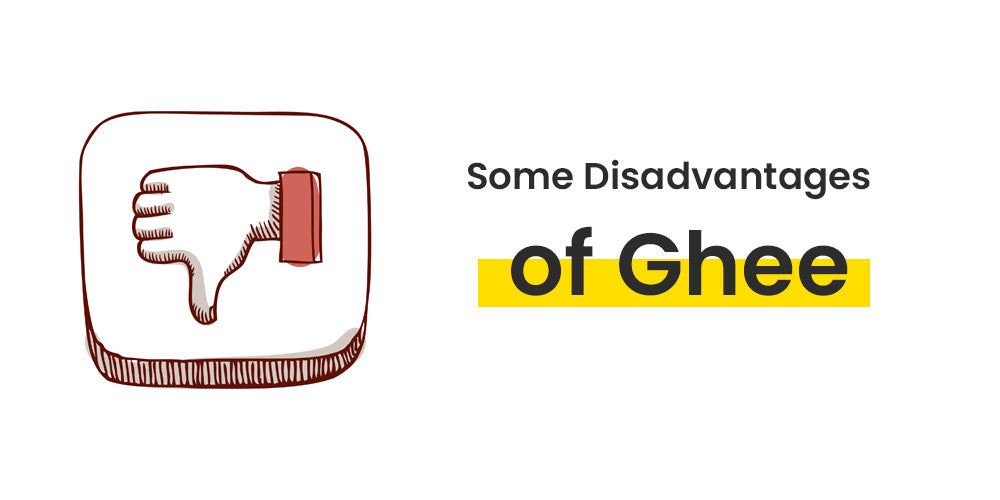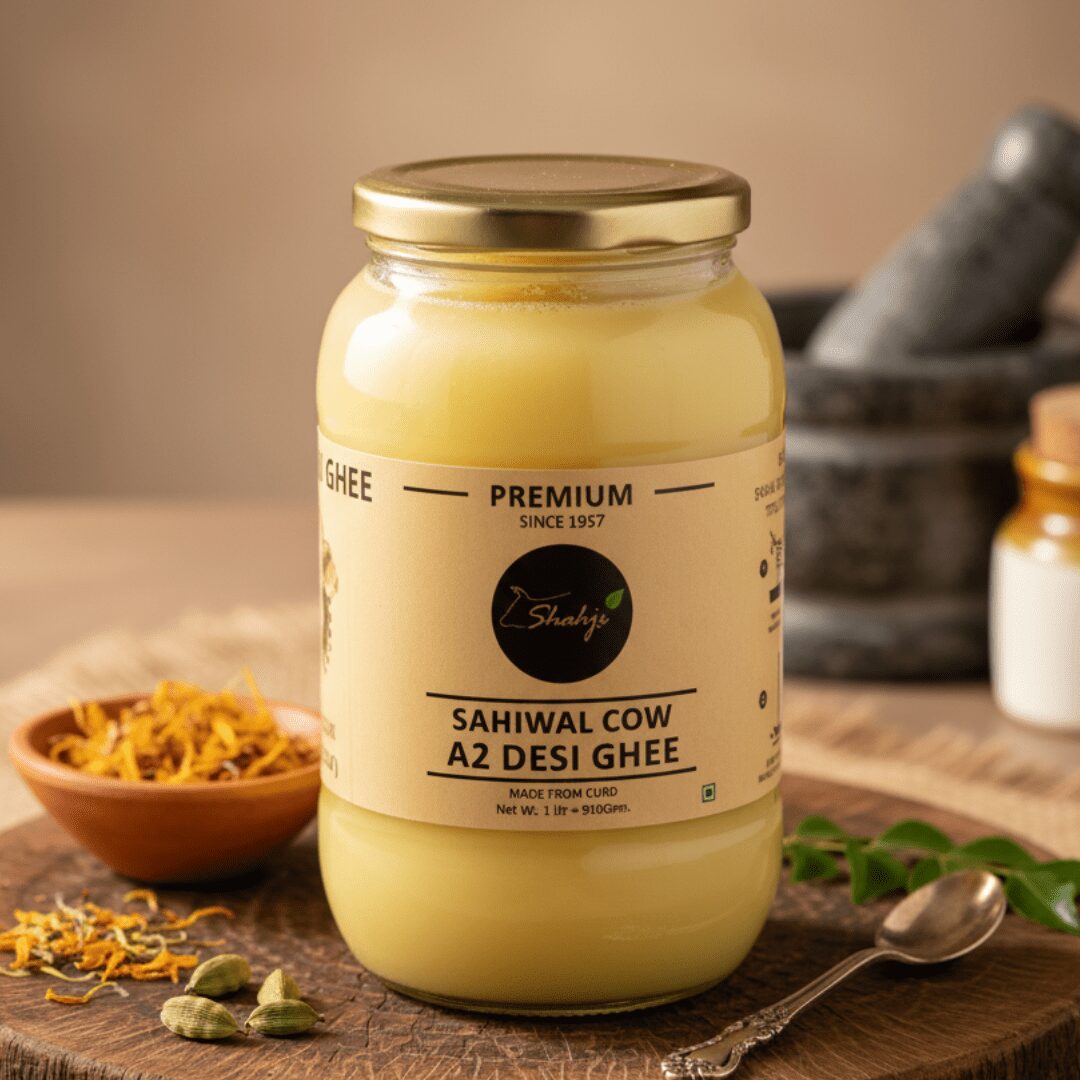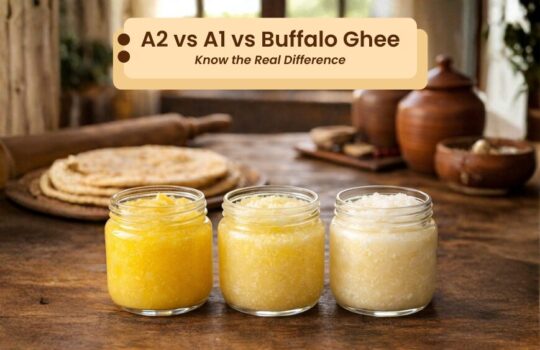13+ Advantages & Disadvantages Of Ghee You Must Know

Ghee has been used in Indian cooking for centuries. Ghee is thought to be extremely healthy. Adding a little desi ghee to any dish improves its flavor. This butter made from cow\’s milk is thought to be healthier than regular butter. This question of whether ghee is superior to butter or not has always bothered me.
So let me tell you that eating ghee has numerous health benefits. However, eating too much of anything can be harmful to your health. Just like every coin has two sides, similarly, ghee also has two sides. Excessive consumption of ghee can harm health your instead of benefiting it, so let\’s know the advantages and disadvantages of eating ghee.
| Snippet content |
| Everything, like a coin, has two sides with advantages and disadvantages. It is not always beneficial to consume ghee. There may be some disadvantages to eating ghee in certain circumstances. |
What Is Ghee?
Ghee is a substance made by separating the liquid part of buttermilk after properly cooking butter.
Ghee is regarded as the best of all oily and greasy substances due to its increased potency when cooked with other medicines. Such characteristics are not found in any other greasy food. Cow\’s ghee is regarded as the best of all ghees.
15+ Amazing Advantages Of Ghee

Ghee has more advantages than disadvantages. First, we will look at the advantages of ghee, and then we will discuss its disadvantages. Here are some notable ghee advantages:
- Contains healthy fats – Ghee contains healthy fats, which help the body produce good cholesterol. Ghee, unlike other types of fat, does not cause heart disease.
- Helps in digestion – Ghee consumption is strongly linked to gut health. Our forefathers used to consume a spoonful of ghee before each meal. It lined the gut, lowering the risk of ulcers and cancer.
- Strengthens the Immune System: Ghee contains butyric acid, which helps the body produce T cells that fight disease.
- Contains essential vitamins – Ghee is a reliable source of essential oil-soluble vitamins A and E, which are required for a healthy liver, hormone balance, and fertility.
- Anti-inflammatory and Anti-cancer – Butyric acid, found in ghee, has anti-cancer properties. It is anti-inflammatory due to the antioxidants in it.
- Because ghee contains no lactose, it is ideal for lactose-intolerant people. It does not cause allergies in people who are allergic to dairy or casein.
- Helps to soothe burns – Ghee is one of the most non-toxic dermatological cosmetics. It is gentle on the skin and aids in the treatment of burns.
- Good for skin – Ghee, which is high in antioxidants, fatty acids, and a natural emollient, aids in the maintenance of healthy skin by locking in moisture, improving skin repair, treating cracks, and softening the skin. This is another popular traditional ghee benefit.
- Good for eyes – Ghee contains vitamin A, which helps the eyes to keep healthy and protect you from night blindness.
- Strengthens bones – Ghee contains Vitamin K, which aids in calcium absorption. It aids in the prevention of tooth decay as well as the prevention of atherosclerosis. Also, check out the best foods for strong bones.
- Helps to reduce weight loss – Ghee increases the body\’s metabolism, making it an excellent weight loss medium. Ghee consumption causes the body to burn other fats, resulting in weight loss.
- Treats menstrual problems – Ghee helps to balance the body\’s hormones. This makes it an excellent candidate for relieving menstrual issues such as PMS and irregular periods.
- Good appetizer – Ghee consumption increases appetite in both children and adults. This is yet another reason to include it in your child\’s diet.
- Increase the taste of the foods – Ghee improves the flavor of any dish to which it is added; for example, ghee makes dal taste better.
- Good laxative – Ghee is a good lubricative. It lubricates the entire body, and clears the intestinal passage, allowing for smooth bowel movements.
13 Disadvantages Of Ghee / Side Effects Of Ghee / Dark Side Of Ghee

Everything, like a coin, has two sides with advantages and disadvantages. It is not always beneficial to consume ghee. There may be some disadvantages to eating ghee in certain circumstances. Let us see where ghee can prove to be harmful to us.
- Ghee contains a significant amount of Vitamin A. Overdoes of Vitamin A can cause headaches, nausea, and vomiting, as well as the risk of choking on the throat.
- Excessive ghee consumption can increase the amount of saturated fatty acids and cholesterol in the body, which is considered harmful to heart disease because It can cause artery clogging.
- Ghee consumed in excess can cause indigestion and diarrhea.
- The internal temperature (tasir) of ghee is hot, so excessive intake of ghee can increase your body heat.
- Though the CLA in ghee has been shown to help some people lose weight, it is also a calorie-dense and fat-rich food. Despite its health benefits, excessive ghee consumption can lead to weight gain and increase the risk of obesity.
- If you have liver problems such as jaundice, fatty liver, or gastrointestinal pain, you should avoid ghee because it can cause serious organ damage. Consuming ghee in moderation, on the other hand, does not harm the liver.
- Ghee can be laxative for some people, but it can also be difficult to digest. As a result, if you frequently suffer from digestive issues such as indigestion, bloating, or constipation, you should avoid it or consume it with caution.
- Ghee is beneficial for pregnant women just before labor pains, but it can be harmful in the early stages of pregnancy. That is why people advise against eating Ghee in the first few months of pregnancy.
- If you have a cough and a cold, you should avoid eating Ghee because it can aggravate your cough and make the situation worse.
- Eating too much ghee can result in a high level of saturated fat, which can lead to a variety of diseases.
- Never take Ghee with honey, it is not good for your body. Because mixing ghee with honey in equal proportions can be toxic and dangerous to your health. When ghee and honey are combined, a substance known as Clostridium Botulinum spreads rapidly throughout the body, causing difficulty in breathing, muscle paralysis, and even death.
- In moderation, ghee calms, Vata, Pitta, and Kapha doshas, but excessive use of ghee can disbalance the tridoshas in the body and can lead to ailments.
- It is critical to note that if the pregnant mother has gallstones, she should consume as little ghee as possible.
Excess of anything is bad. Ghee has numerous health benefits and is considered a superfood, but excessive consumption can lead to a variety of health problems. Moderation is always recommended.
A2 Gir Cow Ghee
1 LTR
Best Price: ₹2125 with Coupons

A2 Gir Cow Ghee 2 Litre Combo Pack
Best Price: ₹4125 with Coupons
A2 Sahiwal Cow Ghee
1 LTR
Best Price: ₹1619 with Coupons

Frequently Asked Questions – FAQs
Is ghee good for the brain?
Ghee is beneficial to the brain because it improves memory. It contains saturated fats, which are required for proper brain and nervous system function.
Who should avoid ghee?
People who are obese or have heart disease, kidney problems, or stomach problems should avoid using cow ghee. It is suitable for everyone once or twice a week. Obese or overweight people should avoid it because it will add to their weight and make them unhealthy.
Is ghee harmful to the heart?
It promotes heart health. Despite its high-fat content, ghee contains a high concentration of monounsaturated Omega-3s. These beneficial fatty acids promote heart and cardiovascular health. According to research, eating ghee as part of a balanced diet can help lower unhealthy cholesterol levels.
Is it OK to eat ghee every day?
While ghee can help with weight loss and heart health when consumed in moderation, eating too much of it on a regular basis can increase the risk of heart disease and weight gain. When incorporating ghee into your regular diet, exercise caution and moderation.
Does Ghee raise cholesterol?
Ghee contains good fat, which is beneficial to health and thus does not raise cholesterol. It aids in the reduction of bad cholesterol.













